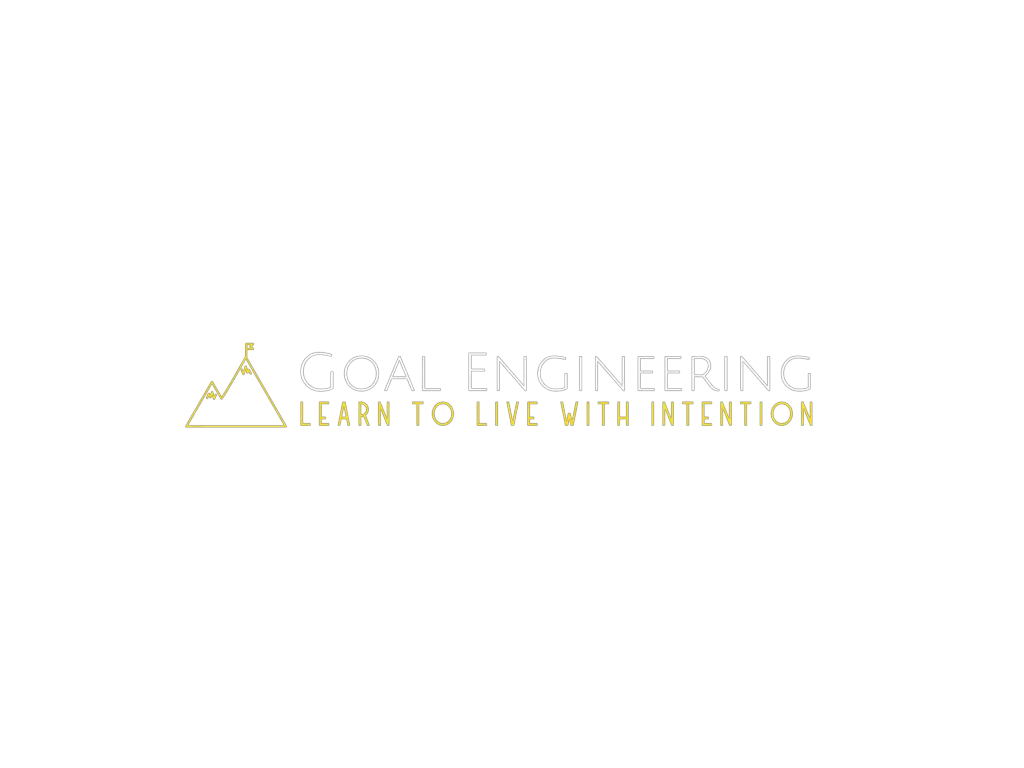Do you struggle to know how to follow through with your goals? Maybe you don’t even get to that point because you feel overwhelmed by them. Or does your past failure to achieve your goals makes you struggle to set them in the first place? What if there was a better way? What if you could stick with your goals all year long, change your life, and reach all your dreams?
Following through with your goals doesn’t have to be difficult like most people make it. To make it happen simply do the following:
- Balance your goals by dividing them into categories, only setting one goal in each category, and only working on each goal for a few minutes each day.
- Make your goals enjoyable by getting excited about your vision for your life, playing to your strengths, and becoming process-driven.
It’s not your fault that you struggle to set goals. There is a lot of information out there, and it can be easy to get overwhelmed. I hope to help you not feel like it’s impossible and that you actually follow through with your goals.
Let’s get right into these ways to stop giving up on your goals so you can make it big all year long! But first, I want to debunk a common myth about goal-setting.
SMART Goals Are Too Overwhelming-and Outdated
Maybe you’ve heard that you need to set SMART goals. This acronym stands for Specific, Measurable, Attainable, Realistic, and Time-Bound.
A man by the name of George Doran came up with this method for goal-setting many years ago. Here’s what he said about it:
“‘How do you write meaningful objectives?’- that is, frame a statement of results to be achieved, Managers are confused by all the verbal from seminars, books, magazines, consultants, and so on. Let me suggest, therefore, that when it comes to writing effective objectives, corporate officers, managers, and supervisors just have to think of the acronym SMART. Ideally speaking, each corporate, department and section objective should be: SMART.”
A lot of people get caught up into this and think that every goal should be SMART. But there are a few major problems with setting SMART goals that actually make it harder than it needs to be.
First, Doran was coming from a manager’s perspective. You are an individual and, although you are the manager of your own life, you probably aren’t a manager of a business.
Additionally, the SMART goals method is nearly forty years old! The Internet wasn’t even around when the SMART goals method was born. Which makes it terribly outdated.
As if that isn’t bad enough, this method has been changed and warped over time, sometimes to each individual’s liking. While I am a firm believer that we should use every bit of advice to our own best knowledge, I think that the SMART goals method just simply doesn’t work anymore.
And maybe it still works in business, but you, here in the 21st century, need something more simple that will let you stay consistent all year long.
A New Way to Set Goals
If you want to reach your goals simply make sure that your goals are:
- Balanced
- Enjoyable
These principles come from my 15+ years of experience with goal setting and achieving. It’s these principles that have helped me lose over 25 pounds, run three half marathons and a full, get accepted into graduate school, marry the woman of my dreams, have three beautiful children, and much more.
Are you ready to learn how to follow through with and achieve your goals by making them balanced and enjoyable? Let’s get started!
1. To Follow Through With Your Goals You Must Make Your Goals Balanced in Type and The Time You Spend on Them
There are four major areas of life that everything you do fits into:
- Faith
- Family
- Finances
- Fitness
Think about your schedule today and you’ll see that this is true. Did you get up and go for a run? That’s fitness. Going to work fits into the finances category. And when you get home each night you probably spend time with your family.
If you want to balance your goals to make them achievable, you must set just one within each of these pillars of life.
While I will get into the detail on what I have learned about each of these pillars another day, I want to go into some of the methods to help you set balanced goals.
First, remember that if you’re feeling overwhelmed, setting only four goals at a time will help a lot to beat that. I’ll be talking about a lot of other ways to beat overwhelm with goal setting here, but what I’m about to show you next is one of my favorites.
Use Warren Buffett’s “Two-List” Method to Set The Right Goals and Only Focus on The Highest Impact Ones
Warren Buffett is one of the most successful investors and businessmen in the world. His net worth as of this writing is about $85 billion. So how did he do it? What was his secret?
Buffet’s success began with learning how to set just the right goals and ignore the rest.
In a conversation with his long-time personal pilot, Mike Flint, Buffett told Flint to divide his goals into two separate lists:
- The top 25 goals that would move his career forward.
- The top five most important goals from the first list.
Upon completing the second list, Buffett asked Flint what his plan was for the goals that weren’t in his top five. Flint replied by saying that he planned to work on those in his spare time. Buffet’s response gives valuable insight into how he rose to success, and how you can too:
“No. You’ve got it wrong, Mike. Everything you didn’t circle just became your avoid-at-all-cost list. No matter what, these things get no attention from you until you’ve succeeded with your top 5.”
The problem with goal-setting is not in setting goals — it’s in setting the right goals, exactly the right goals, and only those goals.
You want to achieve a lot of things. You want to get in better shape, earn more money, improve your relationships, and more. Every one of these is a reasonable goal to have. But unless you just focus on your top five or so, you’ll never have the time you need to complete any of them.
The trick is to focus on setting the best goals for us and to avoid all other goals completely. You know you’re on the right path when you feel that your current goals render all others unnecessary.
Start By Spending Only 15 Minutes a Day on Each Goal
The other practice that I’ve found is beneficial to achieving your goals is to work on them for only about 15 minutes a day, at first.
If you’ve ever given up on your goals in mid-January, you’ll easily be able to see why this is so vital.
Say you had a plan to work on your goal for an hour three times a week. You might end up with 18 or so hours of working on your goals by mid-January.
But the problem you’re overlooking is that working on something for that long each day makes you get overwhelmed and burnt out very quickly.
It’s not easy, for instance, to go to the gym for a whole hour each day when you haven’t been doing it at all for the last six months.
Instead, work on your goals for only 15 minutes every weekday and you’ll accomplish a lot more because you’ll keep at it for longer. It’s far easier to stick to exercising only 15 minutes a day than it is to do the same with a whole hour of exercise every day.
With only 15 minutes each day, that comes out to about 65 hours of working on that goal in a year! Which you’re much more likely to accomplish because working only 15 minutes a day is much more digestible than an entire hour.
That’s over three times the amount of time you’d potentially spend if you pushed yourself too hard and gave up in mid-January.
But what do you spend your 15 minutes a day doing? A few minutes of it should be reading.
Read For Inspiration and to Learn How to Execute Your Goals Properly
The highest indicator of your success in anything is your level of education about that thing. When you read books, you get into your mind the true principles regarding faith, family, finances, and fitness.
It’s even been said that if you read just three books on a subject you’ll become an expert on it, and more knowledgeable on that topic than 99% of people.
For example, I’m listening to the book Brain-Powered Weight Loss by Eliza Kingsford right now. Just simply hearing her tell me the principles of healthy eating helps me make better decisions when I am choosing what and how much to eat every day!
Additionally, when I know those principles, my brain has the power to process them throughout each day. I end up remembering books better when I listen for only a few minutes each day.
Whatever you read will stick with you throughout each day. Choose even just one book for each of the four pillars and read it consistently. You’ll see that you begin to improve slowly but steadily.
What’s more, the people who write these books are already experts. You might not be able to get coaching from them directly, but reading their books is the next best thing!
Plus, as Jim Rohn said, “you become the average of the five people you spend the most time with,” which means that you can become like authors you look up to if you read their books frequently!
2. If You Want to Follow Through With Your Goals They Must Be Enjoyable
There are three principles for setting enjoyable goals:
- Setting forward-thinking goals
- Playing to your strengths
- Being process-driven not outcome-driven
Make Your Goals Forward-Thinking
Interstellar is by far my favorite movie. I’m borderline obsessed with it. The music, acting, emotion, screenplay, and everything about it is terrific. It brought back everything about space that inspired me as a kid and still lights me up inside. I think I saw it in theaters at least ten times.
There was one quote from the movie that stuck with me, and that has impacted my life and goals ever since. It’s from the main character, Cooper:
“I don’t care much for this, pretending we’re back where we started. I want to know where we are, where we’re going.”
When I set goals and make plans, I focus on where I’m going, and you should too.
In my family, I’m more focused on spending quality time with my wife and kids than I am on not being grumpy.
Financially I’m looking forward to where my career is going, rather than the difficulties and stresses of having to make a living.
In my fitness I’m looking forward to all of the races and events and physical stamina that I’m going to enjoy after working out, rather than just merely trying to “lose weight.”
Look at your goals and ask yourself if they are focused on the future. If they’re not, then change them! Use my examples above for inspiration. You’re even welcome to steal them and set those goals yourself if it helps!
Focusing on what’s to come has changed my life, and I know it will change yours too.
Play to Your Strengths
I have come to realize that we are here on this Earth with specific talents, strengths, attributes, and interests to both help us succeed and enjoy life better.
Utilizing your strengths to accomplish your goals makes a massive difference in actually following through with them because you enjoy working on them every day!
Learning to live within your strengths happens in two-parts:
- Find your strengths
- Practice living within them
To find your strengths, all you need to do is ask! A few months ago I contacted those closest to me and asked them to tell me what my strengths are. I mentioned how I have struggled to know my strengths and would like to get better at believing in myself.
I was overwhelmed by the response, and this exercise has changed my life. From all the responses I got an entire page of strengths. I compiled the list into a Google Doc and refer back often to see how I can utilize them to reach my goals.
The other way to find your strengths I learned from the book Will it Fly? by Pat Flynn. Write down the jobs that you’ve had in the past and just write the three things that you enjoyed the most about them. Give each position a grade from A to F.
Pay attention to what you liked about the jobs that you gave the highest grades to, and there are some great sources of your strengths and likes. For usually what you enjoy is what you’re good at, and you enjoy what you’re good at.
And to fulfill the second part and live within your strengths, you need to focus on the process, not the outcome.
Become Process-Driven
Most goals have a finish line to them, and they have to. Think about how boring a soccer game would be without any goals!
But what happens if or when you cross the finish line of your goals? You so often make goals about forcing yourself to do things you hate, rather than finding out what you already like to do. Pushing yourself like this makes the entire goal-setting and achieving process a source of stress.
Instead, you must utilize your strengths and what you enjoy to make goal-setting and personal growth a source of joy once again.
That takes an understanding that it’s okay to do some activities you enjoy to fulfill certain goals. This might mean counting your dance class as exercise rather than trying to make yourself run when you know you hate it, for example.
I found this helpful recently when I realized that it was a lot easier to reach my goal of becoming closer to my son by focusing on what we had in common than trying to force myself to do what I thought we should.
Now, we love spending time together going on hikes and walks, and I’m finally following through with my goal to get closer to him because I like working on it!
Ask yourself what you enjoy doing and utilize those things to help you reach your goals. You’ll soon find that you also like working on each of your goals because you’ll love the process and not just the outcome. And that will make it feel so much easier to stick to them and reach your end goals!
Summary
You want to know how to follow through with your goals so you can change your life and accomplish great things. But it’s not always easy when you’ve got distractions, set your sights too high, and get overwhelmed at everything you want to accomplish.
Following through with your goals doesn’t have to be hard anymore though. To make it happen, ignore the advice to set SMART goals and simply do the following:
- Balance your goals. Break them up into four categories. Set just one goal in each and work on it for just a few minutes each day to stay consistent.
- Make your goals enjoyable by looking forward not backward, playing to your strengths, and focusing on the process, not the outcome.
Setting and achieving goals is the key to becoming anything you want. Follow these steps and you will go much farther than you ever have before.
It’s okay and natural and understandable if you fail at first, but just keep trying. Keep going.
Keep moving forward, and you will get there!





